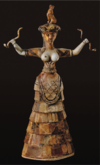Greece Part 2 Flashcards
(41 cards)
What were the types of government in ancient Greece?
- Aristocracies 2. Oligarchies 3. Democracies 4. Mixed Government 5. Tyrannies
What was aristocracies?
ruled by the best person (person with ‘arete’ upper class)
What was oligarchies?
ruled by a few individuals
what was democracies?
ruled by the citizens?
what was mixed government?
aristocracies, oligarchies, combined with monarchies
what was tyrannies?
monarchs that came in unconventionally, by force or bribery
How are people citizens?
have to be a man, be native born in the polis, have to be 21, serve in the military, and have to be a landowner
who were non-citizens?
women, children, slaves, foreign born, and minors
who was sparta?
athens main rival
What was the demos?
all the citizens that make up athens
What were the passages in greece?
Pericles funeral oration, old oligarch, Iliad, oedipus tyrannus
What was the Delian League?
place to store military weapons in case Persians came back.
Who was Pericles
was elected by the demos, he was under reign during the peloponnesian war (30 year war)
What was the Pericles funeral oration?
to respect the people who died in the war. He thanked his ancestors for creating the empire. He talked about how great Athens was. Not just the people have arete but the buildings too. He said all members of demos contribute to society.
What was the Old Oligarch?
disapproving of athens democracy. Author felt that lower class would have a say in democracy. Since rascals dont have arete they dont know what would be best because they would only benefit themselves
Who were rascals?
poor people of athens
What was Dionysius
greek god of drunkeness, but also god of entertainment
What was the Theatre of Epidaurus
where plays would take place, theatres were for religious festivals
What was the Theatre of Dionysius
all theatre’s built on a hill, dug out seats.
What was Aristotle’s poetic on tragedy and comedy?
it lays out what ideal tragedy and comedy were supposed to have
What were plays supposed to have?
arete
What was ideal in comedy?
had to imitate actual life, highlight ugliness, make you laugh. Imitate people who didnt have arete, disabilities, barbarians, etc.
what was ideal in tragedy?
had to imitate things with arete and be realistic
What were main characters in trageties called?
tragic characters, they start off high and have a sudden downfall





